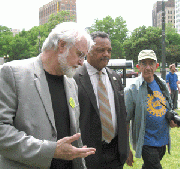DETROIT — As voices of anger and frustration echoed through the air at Grand Circus Park in Detroit on Tuesday, many onlookers couldn’t help but stop by to see what all the noise was about.

|
|
Civil rights activist Jesse Jackson, center, and Reverend Edwin Rowe, L, of Central United Methodist Church in Detroit. PHOTO: NIck Meyer/TAAN |
From calling for a moratorium on housing foreclosures and “bailing out the people” to freeing Palestine and ending the wars against Iraq and Afghanistan, there was no shortage of critical human rights issues to discuss.
The event ran from June 14-17 in response to the National Business Summit held at the Renaissance Center as representatives from large companies like Conoco-Phillips, Dow Chemical and General Motors met to discuss new policy ideas.
Earlier in the day, protestors rallied outside of the Renaissance Center as the leaders met before heading back to the tent city and stage set up in Grand Circus Park.
Reverend Edwin Rowe from nearby Central United Methodist Church, who hosted a large pro-Palestinian rally back in February, was among the featured speakers. He lashed out at those responsible for the financial crisis and used a familiar rallying cry from the Palestinian situation: “No justice, no peace!” he said, referring to bank bailouts.
“Why do we trust Wall Street to help when they are the same people who destroyed the workers?”
Rowe added that the 36th District Court near his church has essentially become a foreclosure court and said banks get paid for foreclosures and even for acts of vandalism against abandoned houses, which are common.
He also bemoaned the lack of support for victims of the crisis from interfaith leaders of all religions.
“Whenever the media sticks a microphone in your face, we need to tell them that our leaders are betraying their own scriptures by not standing with the laid off workers.”
Famous civil rights activist Jesse Jackson stopped by later in the day and brought extra media coverage and more curious passers-by to the event. He also focused on the foreclosure problem.
“The banks have more money than they can spend, yet the people languish in poverty,” he said.
Jackson pointed out that about 600,000 people in the United States lose their jobs each month and that the banks still aren’t lending despite being awash in new funds.
There was also a strong pro-union contingent at the summit, including activist Bryan Pfeifer, who discussed the importance of the working class staying united in the face of corporate power instead of pointing fingers.
“Solidarity is important even with international workers; the union is the only way to go,” he said, saying that an honest job on a living wage is a human right.
Pfeifer recalled stories from his grandfather about how an alliance with a Mexican union helped end an auto strike.
“When unions fight each other, the enemy loves that,” he said.
After Jesse Jackson’s speech, Rowe took time to clarify his words on stage and touch on other issues.
He recalled his trip to Palestine and drew a parallel between the bulldozing of houses by Israeli forces to the situation in America.
“I was there and I saw the bulldozers that said ‘Made in America’ on the side; what’s going on now in America is just another kind of bulldozer.”
He said that most of the foreclosure victims had little chance to save their homes as mortgage rates rose from 5% to around 18% in the cases Rowe was informed about.
Rowe previously discussed with Michigan Governor Jennifer Granholm at an NAACP event the possibility of declaring a moratorium on foreclosures as the state did during the Great Depression in 1934 for five years as opposed to the 90-day policy they currently have.
Rowe said that lawyers sent her information proving it is legal as she requested, but Granholm hasn’t addressed the issue as promised.
With word out that Michigan’s unemployment rate had risen to 14.1% on Wednesday, its highest since 1983, and foreclosures piling up across the state, the odds seem stacked against the working class.
Rowe offered advice on how citizens can do their best keep their heads above water.
“We get on TV and talk about supporting small businesses but we don’t do it. Supporting small businesses is very important.
“We’ve also got to ask our religious leaders from our churches, mosques, and synagogues to do more,” he said, adding that the black civil rights struggle in America was successful because of their support.
“This is a civil rights issue and if we’re ever going to stand behind our workers it has to be here and now.”






Leave a Reply